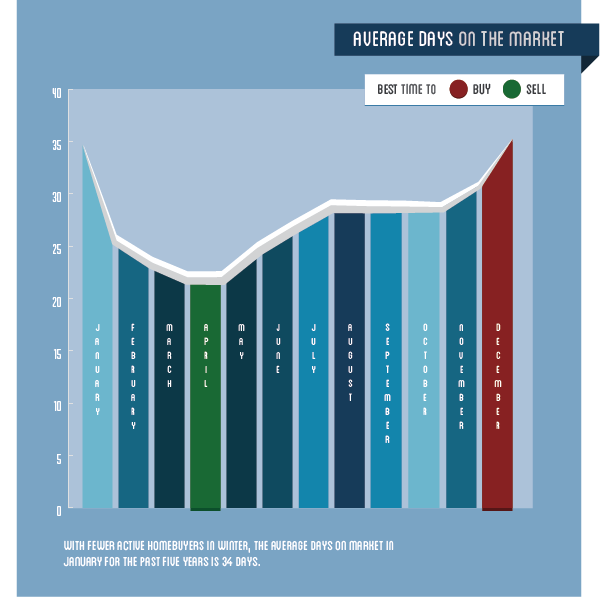The Best Times to Buy or Sell a House
Post on: 8 Сентябрь, 2015 No Comment

Related
The housing market, a reliable bellwether of the economy, seems to be bouncing back.
Many of the nation’s largest home builders surprised analysts by reporting a profit in the quarter that just ended. Home sales continue to rise nationwide, compared with 2011, and home prices also are up. Prices rose 4.6% in August compared with a year ago the largest year-over-year increase in more than six years.
All of this good news has been widely reported, so many Americans are thinking more about wading back into the real estate market, both as buyers and as sellers. But how many people know there are best times to buy and sell houses?
Here are some timing tips from real estate agents that can save home buyers and sellers a lot of money:
The best month to make an offer on a house is January. Fewer buyers are willing to house-hunt during cold, nasty weather, so there’s less competition and few, if any, bidding wars. Sellers also tend to be more motivated than they will be in the spring, when there are more buyers. Why? They may have just received their credit card bills that reflect Christmas spending and may be feeling financially insecure. And their decision to try to sell their houses in the winter means they’re willing to risk listing during a time of the year when properties tend not show particularly well.
The best day of the month to make an offer on a house is the first Tuesday. Why early in the month? Because the homeowner just wrote a mortgage check for a house he no longer wants – or needs to sell and he doesn’t want to write another one. Why Tuesday? Because by Tuesday hes starting to worry that he wont get any offers from house hunters who saw the house the weekend before.

The best time of the year to sell a house is the spring. Buyers come out of the woodwork during the spring, and with tax refund checks in the bank, spring buyers more often pay full price. In fact, sales peak in the spring, helping to explain why about 60% of those who move do so in the summer. Tip within a tip: Don’t price your house with a zero at the end. Studies show that people perceive a precise price, such as $282,284, as lower than rounded ones, such as $280,000, even when the rounded prices are actually lower. Real-life sales show that one zero at the end of an asking price lowers the final sale price by .72% and two zeros lower it by .73%. That may not sound like much, but it can add up to thousands of dollars.
The best day of the week to list your house for sale is Thursday. This is more true during a sellers market, but if you list your house for sale on a Thursday, it will be available right away for weekend showings and by Saturday the most important day of the real-estate week your house will have shown only two days. That’s important because the fewer days on market, the better chance the home will attract a full-price offer. Even if your house doesn’t sell by the next Saturday, it will still show only nine days on market, benefiting from the psychological advantage of a single-digit number.
The best time to stop renting and buy a house is when it costs less to buy than to rent. Makes sense, but how do you figure that out? Find two similar houses – one for sale and one for rent – and divide the asking price by the annual rent. The difference is called the rent ratio. During the 1970s, 1980s and 1990s, the nationwide rent ratio stayed between 10 and 14, then rose to nearly 19 in 2006, when the housing market topped out. (The rent ratio neared 35 in San Francisco and San Jose in 2006.) A rent ratio of 20 or more usually means that it costs considerably more to own than rent after you factor in the mortgage, taxes, insurance, repairs and other expenses. It makes financial sense to buy when the rent ratio is a lot closer to 10 than to 20.














